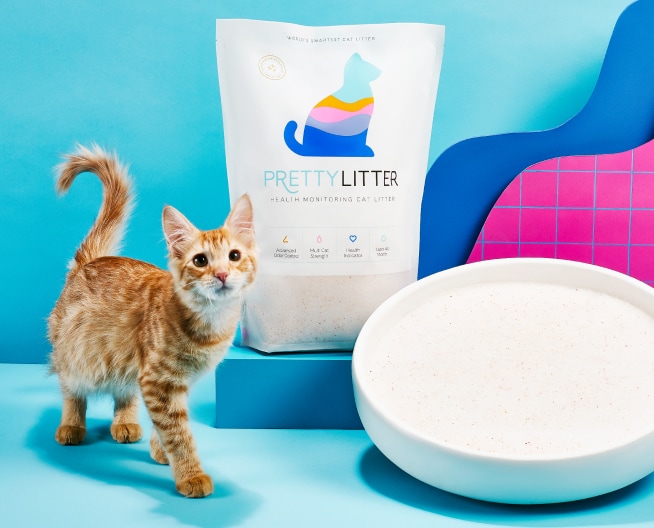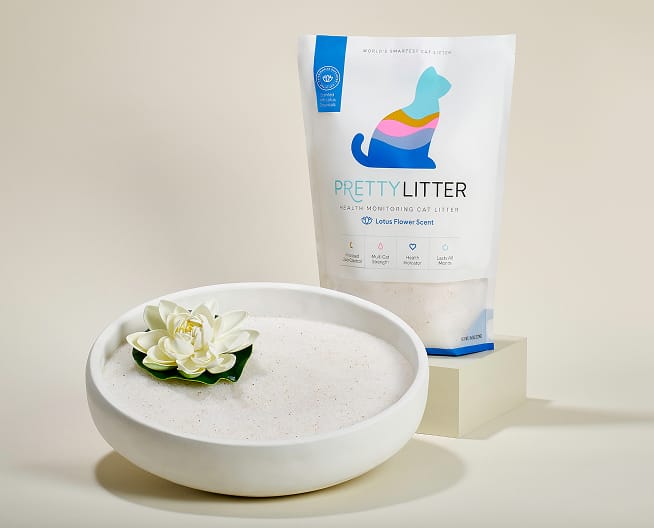April 22, 2020 |7 min read
Is Your Kitty Allergic to Cat Litter?

Written by

Does Your Kitty Have a Cat Litter Allergy?
People aren't the only ones who experience annoying allergies. Our feline friends can also be allergic to things in their environment like food, fabrics, and cigarette smoke. They can even be allergic to kitty litter.
Allergy symptoms in sensitive cats are quite similar to those in humans (with the exception of paw chewing, of course). Allergies can impact your kitty's whole mood. If her behavior has been odd lately, it wouldn't hurt to look into it further. If you suspect her kitty litter is the problem, it may be time to start researching for the next best cat litter for allergies.
Are you worried your kitty might be allergic to her cat litter? Here are the most common indicators of litter allergies and what you can do to bring your kitty some relief.
Identifying Your Kitty's Allergies
Allergies aren't fun for anyone, including cats. But what exactly is an allergy? Your kitty's immune system may be super sensitive to common, harmless substances and treat them as though they are dangerous. These substances are known as allergens.
An allergic reaction occurs when your cat's body tries to fight back against any allergen in her environment.
Our feline friends can be allergic to common substances like certain foods, cigarette smoke, prescription drugs, and flea-control products. Perfumes and cleaning products can also be irritants for sensitive cats. If you have an outdoor cat, she might show signs of discomfort near grass, trees, and other plants.

With so many common allergens out there, how can you tell if your kitty is allergic to cat litter or something else? You'll need to observe her closely for a few days. Figure out where and when she tends to display discomfort. If it's not when she is in or near her litter tray, your cat likely has another type of allergy.
If your kitty does appear irritated when using her litter box, there's a good chance she has a litter allergy. Often, felines may be bothered by the cat litter dust or fragrance. Pay attention to how your kitty acts when near or using her litter box. Signs of irritation or discomfort could indicate an allergy.
Symptoms of a Cat Litter Allergy
There are many symptoms of feline allergic reactions. Your cat may be itchy, chew her irritated paws, or snore due to a scratchy, sore throat. Allergies may make other health conditions worse, such as feline asthma or polydipsia, also known as the excessive drinking in cats. It's important to monitor your cat's health and get help from a veterinarian if you think there is a problem related to your cat’s litter box.
Kitties that are allergic to cat litter may display the following symptoms:
- Sneezing
- Coughing or wheezing
- Itchy skin
- Red or watery eyes
- Puffy face
- Feline acne
- Runny nose
Keep a close eye on your kitty. Do her symptoms flare up while she is using the litter box? It might be because she is stirring up the dust and fragrance in the scented litter while handling her business. Allergic reactions when your kitty is not near her litter box could indicate that litter particles are stuck in her fur or paws. Over time, your cat's symptoms could worsen if she continues to use the same cat litter brand.

Your cat may also avoid her litter box completely if the scented litter inside irritates her. If you notice your once tidy cat going to the bathroom outside of the litter box, a litter allergy might be to blame.
If Your Kitty Is Allergic to Cat Litter
If you suspect your kitty may be allergic to her litter, we recommend getting her help from a licensed professional. Your cat's veterinarian can confirm whether your kitty is allergic to cat litter or something else entirely. Allergy shots and medicines could help alleviate her symptoms. Changing her litter may also be helpful.
Trying a different type of litter could help your cat live a more comfortable life. If your kitty's allergy symptoms decrease significantly after you remove the current litter from your cat’s litter box, it's safe to say the old litter was what was irritating her.
Before changing the type of litter, it's important to research different types to ensure you find the best cat litter for allergies. There are different types of cat litter to choose from: clay litter, silica gel, pine litter, wheat, grass, corn walnut, paper, etc,.
And you either choose clumping or non clumping cat litter. Clumping clay-based formulas can contain a lot of dust, of which may serve as an allergen for your kitty. Many litters also use strong fragrances to cover up unpleasant odor. Naturally fresh, hypoallergenic cat litter is an eco-friendly choice, but some are also quite dusty.
A Silica cat litter may be the best option for your allergy-prone cat. The silica litter formulas are made of silica gel crystals and are virtually dust-free and fragrance-free. That means fewer irritants for your four-legged friend.
PrettyLitter will also help you monitor other aspects of your cat's health. After your kitty does her business, the pH level of her urine will cause PrettyLitter to change color. The color of the litter can help you determine when your cat needs to see her vet, even if she isn't displaying any outward symptoms of being ill.
Cat parents all have one thing in common: We want to keep our kitties happy and healthy. Some cats struggle with feline allergies, and litter allergies can be particularly frustrating for both you and your kitty. Being aware of your cat's allergy symptoms will help you figure out how best to help her. It may be as simple as making the switch to a more natural litter!
Do you have questions about your kitty's health? Drop them in the comments below and we'll do our best to help!
Sources:
1. https://www.healthline.com/health/allergies/cats









